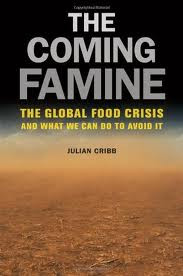
The Coming Famine: The Global Food Crisis and What We Can Do to Avoid It
Julian Cribb
248 pages, University of California Press, 2010
Although most would agree that the world’s population is growing, no such consensus exists on the topic of an impending food crisis. Rather, there are two sides to this debate: Those who worry that the world does not have enough natural resources to feed the growing population, and those who dismiss the argument as alarmist. Julian Cribb’s The Coming Famine takes the position that a global food shortage is inevitable if the human race does not soon rethink the way it eats, farms, and fishes.
Setting aside the inevitable comparisons to Thomas Malthus, whose predictions about famine proved to be vastly overstated, Cribb’s book, without a doubt, is alarmist. The message he hammers home: “The coming famine is a planetary emergency,” which should not be ignored.
Surely Cribb, in researching this book, is aware that writers before him have sounded a false alarm on the same topic and have miscalculated the timing of a world famine. But he does not refute their arguments. Rather, he believes that we are approaching a hungry time “for the simple reason that the world has never been so populous or its resources so fragile.”
I agree with Cribb that a major problem is brewing, one that if ignored will be disastrous. My life’s work is devoted to preventing the very food shortages that he predicts. And I, too, believe that the human population will create serious strains on the current food production system, and that broad changes must occur to head it off. But I see the possible solutions differently.
Foreshadowing the situation that will arise when shortages occur, Cribb points out that many of the hungriest parts of the world tend to be the most war-torn. “Food … is a powerful peacekeeper,” writes Cribb. “We either eat—or we fight.” In his view, there is more at stake than chubby Americans dropping a few dress sizes. What we face is all-out warfare, even in places where people historically have been both well fed and peaceful.
To stave off this calamity, Cribb urges consumers to waste less, to consider food sources, and to develop small farms, which he calls “smallholdings.” Cribb believes that technology holds some solutions, although he is disheartened by “paralyzing complacency and neglect of agricultural science and technology.” Spending on agricultural technology research has, in fact, dwindled since the 1970s, and as a result crop yields have not seen the double-digit increases that they had during the Green Revolution. Cribb argues that “the world’s food supply is not sufficiently secure that we can afford to turn our back on any technology that may help to address these issues in a safe and sustainable fashion,” and I wholeheartedly agree. Although much of the world is stable in terms of food, many of the gains are tenuous at best, and the quest for new technological solutions must continue.
Yet I disagree with Cribb’s designation of who should catalyze this research. Although he suggests that governments should invest more in “sustainable agricultural research and development,” I feel strongly that the solutions will come from the private sector and collaborations among profit-driven entrepreneurs, much as recent environmental solutions have come from companies focused on clean energy and fuel-efficient automobiles. Venture capital investors are already hunting for companies that can solve the food system’s complex problems. Meanwhile, research initiatives driven by the U.S. Department of Agriculture tend to support the tried-and-true, the multinational agribusiness companies that have both improved global food security and perpetuated dependence on petrochemicals, pesticides, and phosphate-based fertilizers. I prefer to place my bets on small companies, university spinouts, and farmers, to commercialize resource-efficient ways of producing food without destroying the planet.
Still, I applaud Cribb for rolling up his sleeves and recapping the strongest arguments for the coming famine. In doing so, he has created an excellent—almost encyclopedic—primer on the topic of global agriculture reform. But if you are looking for a new angle, you will not find it in The Coming Famine. There is no new information, no new theory here. Instead, Cribb uses the book’s 248 pages to catalog the most prevalent arguments for a food crisis, most of which have been in circulation for a decade.
If you are looking for an entertaining read, this is not your book, either. Cribb’s writing is fluent but dry; there are few anecdotes to make this pill easier to swallow. As a result, his book may find its way into the hands of academics and public policy wonks, but it is unlikely to reach an audience big enough to catalyze grassroots change. Perhaps Cribb will inspire Malcolm Gladwell or Michael Pollan to tackle the same topic with a mass-market audience in mind.
Janine Yorio is the founder of NewSeed Advisors, a New York City-based investment bank that focuses on the sustainable agriculture industry and hosts the Agriculture 2.0 conferences.

